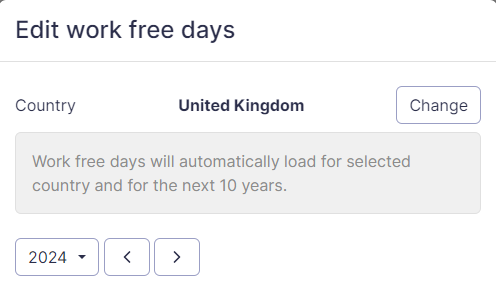Work time limits
Required presence
This setting allows you to easily identify who arrived late or left early. It is applied on both the Dashboard and the Start/End Report.
Expected work time
This setting allows you to define how long the work time per day should be. You can set different work time limits for different users.
By enabling this feature, the Overtime Report will display whether a user has worked over or under their designated hours for each day.
For accurate calculations, ManicTime needs to be informed of all non-working days, such as work free days (public holidays) and personal leave.
ManicTime determines what counts as work time based on the "Work time" setting.
Work free days
Work free days are shown on various charts and are used for overtime calculation. Any work on a work free day is counted as overtime.
To add work free days for your country, choose a country and work free days will be automatically populated.

Additional work days
You can use this settings do define additional work days, like working Saturday or Sunday. List of dates defined here will be treated as a normal work day. If the same day is on both "Work free days" and "Additional work day" lists, it will be treated as a working day ("Additional work days" list wins).
Day start shift
Day start shift allows you to tell ManicTime from when to when the day is counted. A setting of 4 for example will make statistics count days from 4am to 4am. This is useful if your users work through midnight.
Work time
This setting allows you to choose how work time is calculated. This setting will affect all views where Work time is used - "Start / end", "Overtime", "Attendance"... By default, work time is based on Computer usage day duration.
How work time is calculated based on different settings:
Computer usage day duration
Work time is from first active time in a day until last active time in a day. Any Away time which is between first active time and last active time is also part of work time:
Computer usage active time
Only Active time on Computer usage timeline is considered work time:
Tagged time
Work time can also be based on tags. Only tagged time is considered work time.
Tags, which are NOT considered Work, are treated as Away. If a user came to work and worked on a tag which is considered as Away, it will look as if the user was not at work. If this is not desirable, design your tags accordingly. For example start all tags with "In office" or "Out of office".
Tagged time + Computer usage active time
Work time is total tagged time, while Computer usage active time is used only for untagged time. Tags, which are NOT considered Work, are treated as Away even if Computer usage timeline shows Active at the time.
